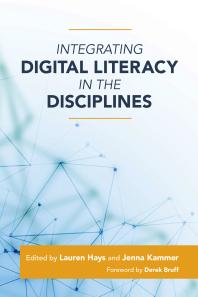Product desciption
Integrating Digital Literacy In The Disciplines Lauren Hays Jenna Kammer by Lauren Hays; Jenna Kammer 9781000972740, 1000972747 instant download after payment.
Digital literacy has become the vital competency that students need to master before graduating. This book provides rich examples of how to integrate it in disciplinary courses.While many institutions are developing introductory courses to impart universal literacy (skills students need to know) and creative literacy (skills for creating new content), discipline-specific skills (skills needed to succeed within a specific discipline) are a vital extension to their learning and ability to apply digital literacy in different contexts. This book provides examples of how to integrate digital literacy across a wide variety of courses spanning many domains.Rather than a wholly new core institutional outcome, digital literacy adds to the development of critical thinking, communication, problem-solving, and teamwork skills by building students' capacities to assess online information so they can ethically share, communicate, or repurpose it through the appropriate use of available digital technologies. In short, it provides the vital digital dimension to their learning and the literacy skills which will be in increasing demand in their future lives.Following introductory chapters providing context and a theoretical framework, the contributing authors from different disciplines share the digital competencies and skills needed within their fields, the strategies they use to teach them, and insights about the choices they made. What shines through the examples is that, regardless of the specificity of the disciplinary examples, they offer all readers a commonality of approach and a trove of ideas that can be adapted to other contexts.This book constitutes a practical introduction for faculty interested in including opportunities to apply digital literacy to discipline-specific content. The book will benefit faculty developers and instructional designers who work with disciplinary faculty to integrate digital literacy. The book underscores the importance of preparing students at the course level to create, and be assessed on, digital content as fields are modernizing and delivery formats of assignments are evolving.Domains covered include digital literacy in teacher education, writing, musicology, indigenous literary studies, communications, journalism, business information technology, strategic management, chemistry, biology, health sciences, optometry, school librarianship, and law.The book demonstrates a range of approaches that can used to teach digital literacy skills in the classroom, including:·Progressing from digital literacy to digital fluency ·Increasing digital literacy by creating digital content · Assessment of digital literacy ·Identifying ethical considerations with digital literacy ·Sharing digital content outside of the classroom ·Identifying misinformation in digital communications ·Digitizing instructional practices, like lab notes and essays ·Reframing digital literacy from assumption to opportunity ·Preparing students to teach digital literacy to others ·Collaborating with other departments on campus to support digital literacy instruction ·Incorporating media into digital literacy (digital media literacy) ·Using digital storytelling and infographics to teach content knowledge] ·Weaving digital literacy throughout the curriculum of a program, and with increasing depth


